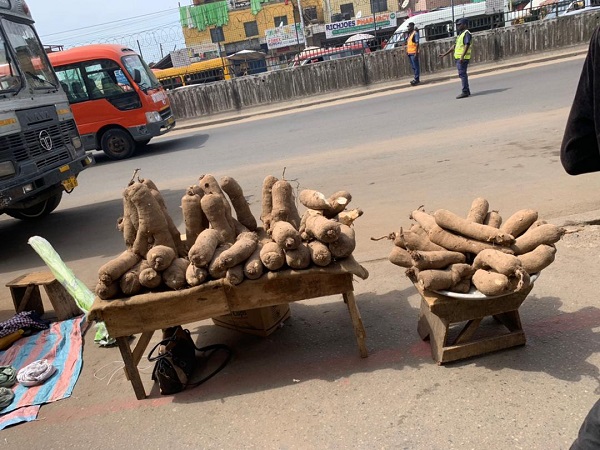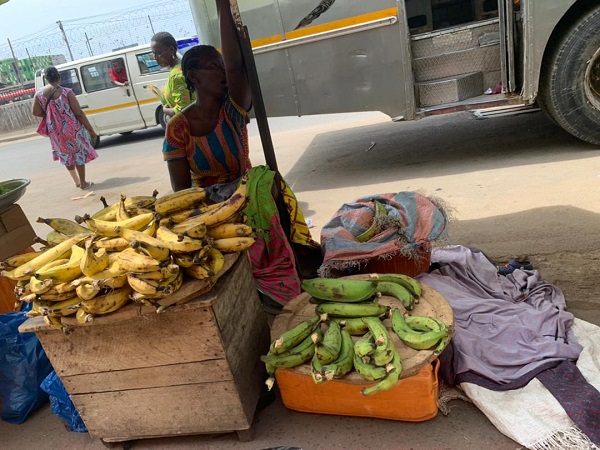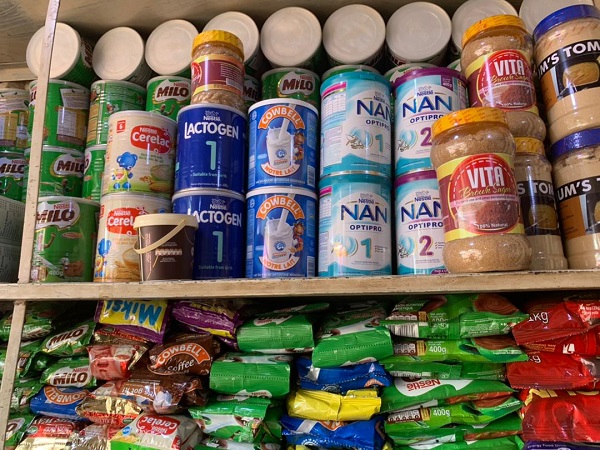
Traders, consumers lament rampant increase in prices of goods, services
A number of traders and consumers are appealing to authorities to implement policies to reduce the rampant increase in prices of goods and services on the market.
Some shoppers also told The Mirror in an interview that shop owners were taking undue advantage of the situation to double and triple their prices.
Visit
A market check from the second week of October to the third week, found that prices of items -- consumables and non-consumable goods-- kept skyrocketting. Prices of food stuff had increased marginally, a situation that was attributed to the increase in fuel prices and depreciation of the cedi against the dollar.
At the Kaneshie market for example, the prices of food items were expensive as compared to Makola, Nima, Madina, Nungua and other markets in Accra.
One olonka cup of gari was sold between GH¢16 and GH¢17 while a tuber of yam was selling between GH¢18 and GH¢20.

A tuber of Yam is sold between GH₵18 and GH₵20
A trader at the Kaneshie Market, Kate Kwateng , said the hikes in fuel prices had affected the prices of some items transported from other parts of the country.
“The current fuel hikes are what makes everything expensive on the market. I bought gari from the Northern Region; it was between GH¢12 and GH¢13 just this Monday. I had to sell the ‘olonka’ GH¢17 for the yellow gari and GH¢16 for the white one due to the distance.”
Another trader who sold cosmetics and gave her name as Adjoa Mensah blamed the increase on transportation, explaining that “ I get the pomade I sell at the same price; however, due to the lorry fares, I have to increase the price of my items. I am not comfortable with that but I cannot reduce the prices, else I will run at a loss.”
According to her, “it is heartbreaking to see how some customers react to the new prices. Sometimes they say all manner of hurtful words but I have to be patient in dealing with them. I just hope all this will end one day.”
At the Nima Market things were fairly cheaper compared to other markets visited.
A five-litre sunflower oil bottle which was sold at GH¢170 from the beginning of October was selling at GH¢220 as of Tuesday October 25, 2022, while 10 litres was going for GH¢370.
“For instance, if I buy the five litres at GH¢200 this morning, by the close of day, I would be told that it has increased. I equally need to increase mine though I bought it before it was increased. If I still sell it at GH¢200 and it's being increased to GH¢210, I will incur a loss when I go to purchase another one,” one of the traders told The Mirror.
An onion seller, Halima Fuseini, expressed similar sentiments. The prices of onions ranged between GH¢12, a small paint bucket and GH¢30 depending on the sizes.

Onions for sale at the Nima market
A dealer in grains and cereals, Mariama Asante , said prices of her wares had increased steadily, stating that a bowl of maize was sold at GH¢40 while a bowl of millet was GH¢15 as against GH¢8.00 and GH¢10 respectively some few days back.
A bag of millet was sold between GH¢700 to GH¢750, while a crate of eggs ranged from GH¢30 to GH¢35 with three pieces going for GH¢5.
The situation wasn’t different at the Madina Market.
Patience Ahiabor said the price of a bag of cassava dough was between GH¢75 and GH¢700 depending on the size of the bag while corn dough was between GH¢80 to GH¢800.
Beans used to be GH¢5 but was selling at GH¢ 8 depending on the size of the cup. The margarine cup of fresh groundnuts was GH¢4 cedis and above.

Five fingers of ripe plantain sold at GH¢20 at the Kaneshie market
Both wholesale and retail sellers complained about the depreciation of the cedi against the dollar and continuous hikes in fuel prices.
At the Nungua Market , a trader in tomatoes, Rita Boateng, said though there was a supply of vegetables all the time, the price kept increasing, adding that she bought a crate of fresh tomatoes for GH¢300 last week but had to buy at GH¢400 that week.
A dealer in unisex belts, bags and shoes at Makola, Akwasi Yeboah said he was amazed at the rate at which prices were shooting up, adding that he had no option than to add up to his selling prices in order to make some profit.

Prices of baby foods and other ‘provisions’ keep rising steadily
In the Volta Region, specifically Mafi Kumase, the prices of foodstuff were comparatively cheaper. Madam Dzigbordi Fianyo said,” it is quite difficult when people don’t purchase your items because almost everyone living within the town and its environs have farms. We depend on those from other regions and sometimes Togo and Nigeria to make sales,” she added.
Online sellers
Some online sellers grumbled that the economic hardship was preventing some clients from purchasing clothes, jewellery, shoes and accessories as they are more focused on purchasing only basic necessities.
Goldilocks Outfits, an online store which had been running for two years, claimed to have recorded the lowest sale this period since it began operation .
The owner, Queenstar Adjei, attributed that to the fact that she dealt in items that could be classified as luxury and that clients were currently only purchasing in limited quantities .
“My infant business is on the verge of collapsing because the capital I used to purchase my first stock keeps dwindling and there are only a few orders per day affecting my profit as well,” she said,
Another concern was raised by a vendor at the Makola market, Rita Ashong , who sells artificial nails, make-up and pedicure kits, in store and online. She said the increase in fuel prices had affected delivery fees paid for her online business.
“To prevent the high delivery fee, they don’t buy at all. Online buyers have also been my main target as just a few people visited my store to purchase. This was previously convenient as clients could be in their comfort zone to place an order and receive at their doorstep but now it is impossible,” she lamented.
